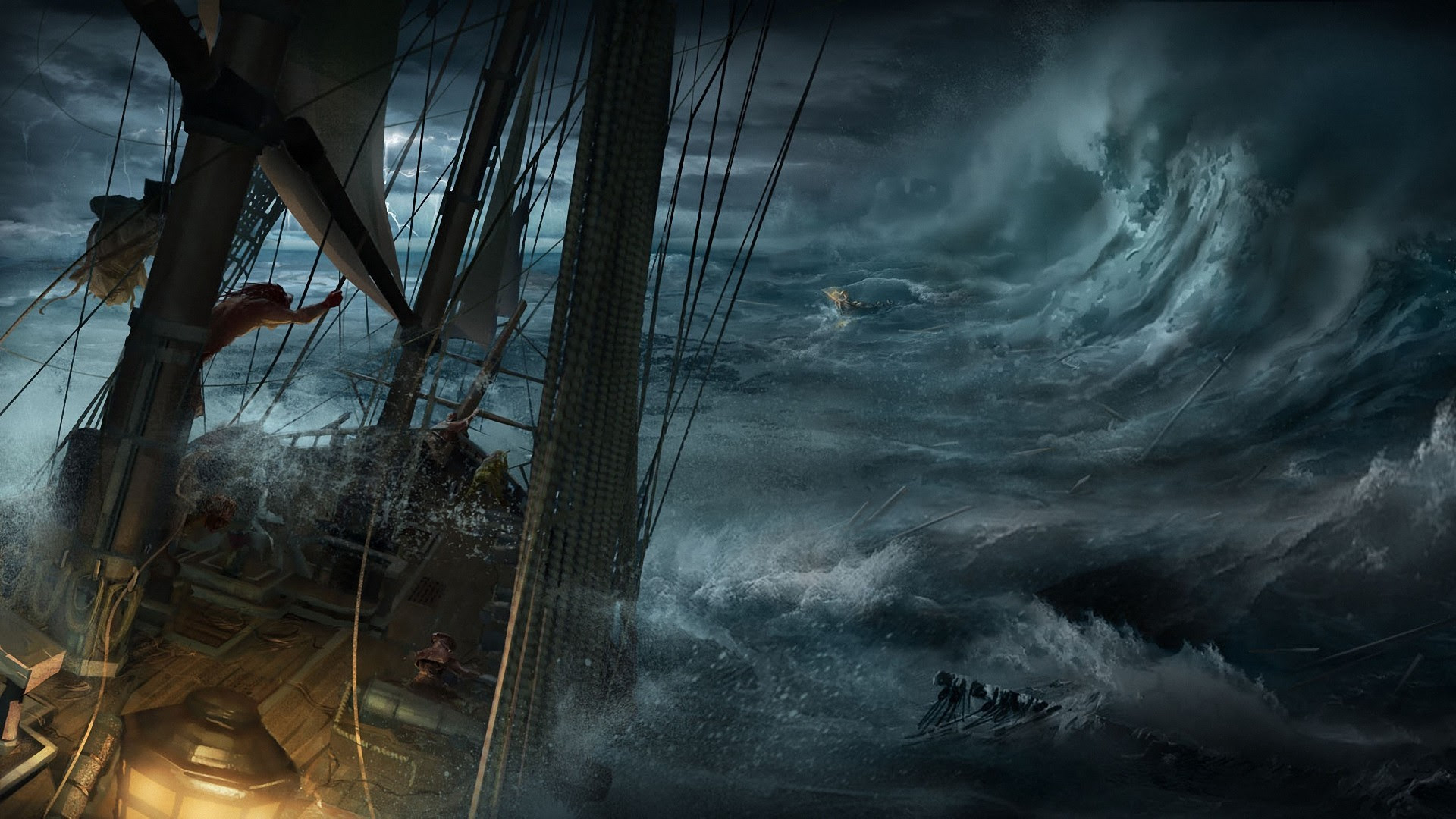|
Paul, Paying for Shipwrecks, and Aliens
|
Replies: 5
| visibility 101
|
All-In [29963]
TigerPulse: 100%
Posts: 8867
Joined: 10/31/10
|
Paul, Paying for Shipwrecks, and Aliens

3
Mar 31, 2024, 10:28 PM
|
|

The Storm
Act 27:13 "When a gentle south wind began to blow, they saw their opportunity; so they weighed anchor and sailed along the shore of Crete. 14 Before very long, a wind of hurricane force, called the Northeaster, swept down from the island. 15 The ship was caught by the storm and could not head into the wind; so we gave way to it and were driven along. 18 We took such a violent battering from the storm that the next day they began to throw the cargo overboard. 19 On the third day, they threw the ship’s tackle overboard with their own hands.20 When neither sun nor stars appeared for many days and the storm continued raging, we finally gave up all hope of being saved."
A violent death was the least of Paul's problems, because someone had to pay.

Baltimore bridge collapse probably caused billions of dollars in damages. Who owes what may come down to ancient laws from Greece [Redacted]
“The massive cargo ship crash that destroyed Baltimore's Francis Scott Key Bridge on Tuesday will probably cost various shipping companies and insurers billions of dollars in damages. But lawyers, legislators and business owners will need to turn to one of the oldest subjects of law to figure out who owes what. That's because it all comes down to maritime law – an ancient, often seemingly eccentric legal field that still relies on some precedents set in the Iron Age.
Maritime law is steeped in antiquity. it goes back to the Phoenicians, it goes back to the Greeks," Sean Pribyl, a partner at the law firm Holland & Knight, said in an interview with CNN. Maritime law is rooted in the need to settle disputes and enforce rules between different peoples, even before there was the concept of countries with definitive laws.
It's been thousands of years of vessels going to sea and carrying cargo or passengers. Over centuries and centuries of practice, maritime law developed its own codes, and those were enshrined in more recent international conventions and then domestic laws as well around the world," Pribyl said. From ancient Mediterranean islands to the Titanic to longshoremen on the Brooklyn docks, CNN looked into some of the historic cases that may become relevant as the ramifications of this deadly and costly crash come to light.
Ancient history
About 3,000 years ago, primeval lawmakers on the seafaring island of Rhodes faced a conundrum. Back in 1000 BCE, Rhodians were dominating the Mediterranean with their fast-moving ships and bringing boatloads of riches back to their island. But not every voyage went as planned – if the seas were rough, crews would sometimes have to ditch their valuable cargo to lighten their load and keep the ship afloat.
The problem was that the crews often couldn't decide whose goods to throw overboard into the water below. They could fight viciously over it, wasting the small window of time they had to save the boat and themselves. Maybe they should lose the olive oil, or the wine, or the fine cloth. But why should the oil merchant, the wine merchant, or the cloth merchant have to suffer on their own for a decision made by the crew?
So the wise legislators came to a solution – a remedy that would go on to guide maritime law for millennia, eventually making its way to modern-day Baltimore, where it could play a role in the monetary ramifications of the collapsed Francis Scott Key Bridge. All of the merchants in ancient Rhodes who saw their cargo arrive safely ashore would contribute an appropriate portion of their earnings to compensate the merchants who lost their haul.
In modern terms, if some cargo must be thrown over the side, the losses are borne by everybody who had cargo onboard, equally. That rule, known as the general average, is still a guiding principle of maritime law. These days, it can also extend to costs related to repairs and other expenses said Pribyl, who co-authored the American Bar Associations chapter on General Average in its Damages book. That means the costs of damage to the ship and lost cargo in Baltimore could be split between the ship owner and the merchants with items on the ship. Thankfully, they have insurance.
Chugging along
Some may find it strange that a group of men from the cusp of the Iron Age are still dictating modern law, but maritime lawyers are used to it. America's forefathers even referenced this ancient code of law when writing the US Constitution, and both the Supreme Court and federal laws have validated this archaic legal framework, incorporating it into federal legislation. This means that the "no rules in international waters" trope that has become a fixture of American media, which depicts a world where crimes on the high seas go unpunished or where ship captains are granted broad legal powers, isn't exactly accurate. In reality, said Davies, the law is pretty clear, well-established and possibly even boring. "Maritime law chugs along in the background, and then some kind of catastrophe happens and people realize there's this different body of law, very different from what applies on land," said Davies. "And then they have to find out what it is."
https://www.youtube.com/watch?v=EsxW-xzLhGQ
Bill you? They will.
|
|
|
|
 |
Hall of Famer [24515]
TigerPulse: 100%
Posts: 13987
Joined: 7/3/01
|
Re: Paul, Paying for Shipwrecks, and Aliens

1
Mar 31, 2024, 10:38 PM
|
|
The old laws are still the best ones, I guess.
|
|
|
|
|
 |
CU Guru [1013]
TigerPulse: 97%
Posts: 1462
Joined: 11/15/23
|
Re: Paul, Paying for Shipwrecks, and Aliens

2
Apr 1, 2024, 7:59 AM
|
|
11 If two men are fighting and the wife of one of them comes to rescue her husband from his assailant, and she reaches out and seizes him by his private parts, 12 you shall cut off her hand. Show her no pity.
Yeah, I guess...
I mean, it's why I personally don't wear linen and wool together, at least.
|
|
|
|
|
 |
Orange Blooded [2168]
TigerPulse: 69%
Posts: 2583
Joined: 6/4/22
|
Re: Paul, Paying for Shipwrecks, and Aliens

1
Apr 1, 2024, 11:29 AM
|
|
This is why I just shake my head when I hear someone say the bible should be the law. Clearly they do not know the bible.
|
|
|
|
|
 |
Hall of Famer [24515]
TigerPulse: 100%
Posts: 13987
Joined: 7/3/01
|
Re: Paul, Paying for Shipwrecks, and Aliens

2
Apr 1, 2024, 10:33 AM
|
|
You likely know this, but the idea of contractually sharing risk maybe started with shipping. This is digging back into law class memory, so details may be off, but the description of a merchant voyage would be posted in public. People willing to assume the losses in the event of unplanned submersion, in return for share of the profits, would write their names under the description. The modern process is still called 'underwriting'.
I have no idea how that worked, but I assume that the description included the items to be acquired and the total percentage offered for the underwriting. Anyone adding their name had to be a student of the markets to assess the risk/reward.
But the concept surely predated that, so would be interesting to know how that was handled in Paul's day. Maybe was as simple as raising investors to fund, in advance, the cost of the venture. And of course your example covers what happens if the venture is partially successful, sort of like getting sick instead of dying.
Message was edited by: CUintulsa®
|
|
|
|
|
 |
All-In [29963]
TigerPulse: 100%
Posts: 8867
Joined: 10/31/10
|
Re: Paul, Paying for Shipwrecks, and Aliens

2
Apr 1, 2024, 1:27 PM
|
|
Good stuff. I didn't know that. I'd imagine the same type of loss-protection went into merchant caravans, etc., like on the Silk Road, from bandits, or weather, and so forth. All that probably has a pretty cool history all its own.
|
|
|
|
|
|
Replies: 5
| visibility 101
|
|
|
|



 to award
the award.
to award
the award.







